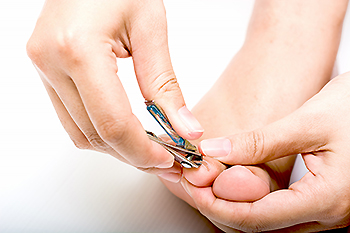
Proper toenail care is important for maintaining foot health and preventing issues like ingrown toenails and infections. Start by soaking your feet in warm water for about 10 minutes. This softens the nails, making them easier to cut and reducing the risk of cracking. Use a high-quality nail clipper or scissors specifically designed for toenails, as regular fingernail clippers may not provide a clean cut. When trimming, cut the toenails straight across rather than rounding the edges. This approach helps to prevent ingrown toenails, which occur when the nail grows into the surrounding skin. Avoid cutting the nails too short, leaving a small white edge at the tip to prevent discomfort and reduce the risk of infection. After cutting, smooth any rough edges with a nail file to avoid snags and cuts. If you need help with problematic toenails, it is suggested you schedule an appointment with a podiatrist.
Ingrown toenails can become painful if they are not treated properly. For more information about ingrown toenails, contact Nrup Tolat, DPM of Atlanta Total Foot & Ankle Care. Our doctor can provide the care you need to keep you pain-free and on your feet.
Ingrown Toenails
Ingrown toenails occur when a toenail grows sideways into the bed of the nail, causing pain, swelling, and possibly infection.
Causes
- Bacterial infections
- Improper nail cutting such as cutting it too short or not straight across
- Trauma to the toe, such as stubbing, which causes the nail to grow back irregularly
- Ill-fitting shoes that bunch the toes too close together
- Genetic predisposition
Prevention
Because ingrown toenails are not something found outside of shoe-wearing cultures, going barefoot as often as possible will decrease the likeliness of developing ingrown toenails. Wearing proper fitting shoes and using proper cutting techniques will also help decrease your risk of developing ingrown toenails.
Treatment
Ingrown toenails are a very treatable foot condition. In minor cases, soaking the affected area in salt or antibacterial soaps will not only help with the ingrown nail itself, but also help prevent any infections from occurring. In more severe cases, surgery is an option. In either case, speaking to your podiatrist about this condition will help you get a better understanding of specific treatment options that are right for you.
If you have any questions please feel free to contact our offices located in Woodstock and Atlanta, GA . We offer the newest diagnostic and treatment technologies for all your foot and ankle needs.
